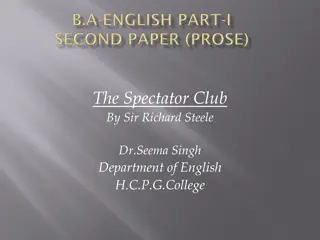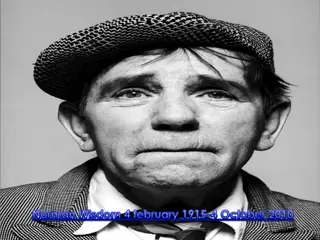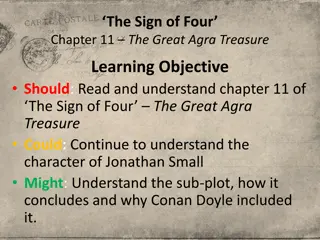The Life and Legacy of Sir Arthur Conan Doyle
Born in Scotland in 1859, Sir Arthur Conan Doyle is renowned for creating the iconic detective Sherlock Holmes. His diverse literary works encompassed fiction, historical tales, and spiritualism advocacy. Despite his rational detective tales, Doyle held a deep interest in paranormal phenomena. Knighted for his wartime contributions, he later championed spiritualism, garnering both acclaim and opposition. Doyle's rich legacy continues to fascinate readers worldwide.
Download Presentation

Please find below an Image/Link to download the presentation.
The content on the website is provided AS IS for your information and personal use only. It may not be sold, licensed, or shared on other websites without obtaining consent from the author.If you encounter any issues during the download, it is possible that the publisher has removed the file from their server.
You are allowed to download the files provided on this website for personal or commercial use, subject to the condition that they are used lawfully. All files are the property of their respective owners.
The content on the website is provided AS IS for your information and personal use only. It may not be sold, licensed, or shared on other websites without obtaining consent from the author.
E N D
Presentation Transcript
Sir Arthur Conan Doyle Author background
Born May 22, 1859, Scotlanddied July 7, 1930, England Scottish writer best known for his creation of the detective Sherlock Holmes. One of the most vivid and enduring characters in English fiction. Doyle received Bachelor of Medicine and Master of Surgery from the University of Edinburgh's Medical School. While in school, Doyle developed the skill of observing the most minute details regarding a patient's condition. This master of diagnostic deduction became the model for his literary creation, Sherlock Holmes.
Doyle's creation of the logical, cold, calculating Homles, the "world's first and only consulting detective," sharply contrasted with the paranormal beliefs he addressed in a short novel of this period, The Mystery of Cloomber (1889). Doyle's interest in both scientifically supportable evidence and certain paranormal phenomena exemplified the complex complete opposite beliefs he struggles with throughout his life. Doyle wrote fiction-short stories and novels, semiautobiographical novels, historical fiction, and nonfiction. Doyle was knighted in 1902 for his work in a hospital in South Africa, and other services during the South African War.
Viewed his most important efforts to be his campaign in support of spiritualism, the religion and psychic research subject based upon the belief that spirits of the departed continued to exist in the hereafter and can be contacted my those still living. He donated most of his literary efforts and profits later in his life to this campaign. He became the world's most renowned proponent of spiritualism, but he faced considerable opposition for his conviction from the magician Harry Houdini and in a 1920 debate with humanist McCabe. Died in his home of a heart attack. At his funeral family and members of the spiritualist community celebrated rather than mourned the occasion of his passing.























